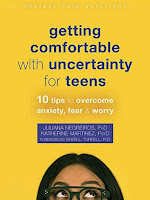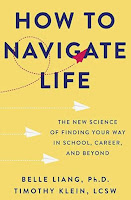It is August and that means school will be starting soon. Student mental health continues to be a huge concern and here are a couple of new texts intended to help students better cope with anxiety and life choices.
GETTING COMFORTABLE WITH UNCERTAINTY FOR TEENS by Juliana Negreiros and Katherine Martinez offers “10 Tips to Overcome Anxiety, Fear, and Worry.” Based in Canada and both psychologists who work with teens, Negreiros and Martinez employ a conversational tone which will readily appeal to our students. Here, there are literally ten chapters focusing on tips like ways to drop the struggle with uncertainty; that tip involved using SOS, “slowing down, observing what’s going on around you, and then shifting into meaningful activity.” The authors encourage patience and offer calming advice, encouraging readers to “pace yourself while reading the tips as there are lots and lots of skills to learn that need practice and repetition to work.” This text is one more example of the types of practical guides which individual students, advisors and/or social workers can consult for helpful information. I especially like how Negreiros and Martinez encourage reader involvement with questions and surveys as well as how the authors summarize the learning and potential coping strategies in each section. They also incorporate quotes and examples from their teen clients. The listed notes are only a few pages but the cited studies cover numerous topics (transgender survey, micro-aggressions and race, mindfulness and self-compassion to name just a few) which could be related to uncertainty and anxiety for students. GETTING COMFORTABLE WITH UNCERTAINTY FOR TEENS will be especially helpful for those with moderate anxiety by encouraging them through easily manageable steps to take calculated risks, build social support, and pursue passions.HOW TO NAVIGATE LIFE by Belle Liang and Timothy Klein covers “The New Science of Finding Your Way in School, Career, and Beyond.” Liang, professor of Counseling Psychology at Boston College, and Klein, clinical therapist and school counselor, do a good job of “chunking” the book’s content so that sections are clearly labeled and bullet-pointed or highlighted; tables and charts are used to help summarize key points. The first part of the book contains a chapter for each of five principles: mindset, games, skill sets, value types, and needs. Then, Part Two looks at the work of re-purposing, particularly in terms of relationships and certain life stages (high school, college, and the workplace). Throughout, Liang and Klein provide toolkits, reflection prompts, and exercises for readers. This text will require thoughtful commitment, as the author readily acknowledge. The text is filled with jargon and ideas designed to provide, as the publisher says, "An essential guide to tackling what students, families, and educators can do now to cut through stress and performance pressure, and find a path to purpose.” One chapter alone looks at affirmation, advocacy, challenges and the role of snowplow parenting, and mentoring. All of which seems to be written more for the adults (“parents, educators, and life mentors”) in a teen’s life. Liang shares personal family stories, too, commenting on her own father’s Seeker’s Journey – “his courage to step off the path again and again to answer the call to adventure. It was not easy. It involved wrong turns, failures, and pivots. It involved persistence and sacrifice. It involved great blessings and reward for generations.” Be prepared to devote significant time to this text where the authors – whose expertise and credentials are impressive – argue repeatedly (and somewhat ironically) for self-reliance and becoming whatever you choose to be. Roughly twenty percent is devoted to source notes which could be helpful to psychology classes and discussion groups.





No comments:
Post a Comment